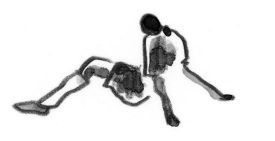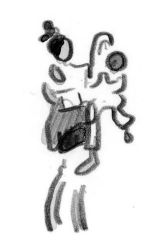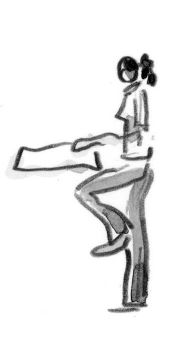Ridiculous/Hilarious/Terrible/Cool (23 page)
Read Ridiculous/Hilarious/Terrible/Cool Online
Authors: Elisha Cooper

BOOK: Ridiculous/Hilarious/Terrible/Cool
11.84Mb size Format: txt, pdf, ePub
Emily is dominating today's game. It's a sunny day, and as she shuffles around the manicured grass field on Parker's Lincoln Park campus, her navy blue jersey and orange socks are shining. The ball never leaves the Parker side of the field. And yet, Emily's team can't score. The Parker players are as wide as their mothers are thin, and size matters. In fact, it roots them to the ground like a wall, and whenever Emily passes the ball close to the goal, one of the walls pokes it away with a toe.
In the second half, a perfectly threaded pass from Emily springs her sister on a breakaway, but the last defender takes her down from behind with a hard tackle. She stays on the ground, Emily bending over her, then is carried off the field.
When play resumes, a Parker player slams into the Payton goalkeeper with a reckless charge. Emily barks,
“Stay the fuck away from my goalie!”
She and the girl jog up the field, shoulder to shoulder, jawing at each other.
“Stay the fuck away from my goalie!”
She and the girl jog up the field, shoulder to shoulder, jawing at each other.
Impatience seeps into Emily's game. Her sister, who has emerged as the team's scorer, is no longer there to score. During one stoppage Emily bites her nails.
With a minute to go, Emily tries to win the game by herself. She gathers the ball at midfield, fakes left, fakes right, making one pony-tailed defender miss, then another, then a third. With a final deft touch Emily slides the ball around the last defender. She's alone against the goalie. But her shot hits into the goalie's outstretched hands, and over the crossbar. Emily runs the ball as fast as she can to the corner for the free kick, but time runs out, and who was she going to kick it to anyway?
Afterward, Emily seeks out the other team's captain and apologizes for her outburst. Then she slumps in the middle of the field. There are few things worse than tying a bad team. When she describes the game later that week all she says is: “Awful.”

Diana wraps a flotation noodle around the waist of a toddler, pulls it tight, and tosses the toddler into the water. Then onto the next: noodle, tie, toss.
The Piotrowski Park pool is inside a ripped canvas dome. The rest of Piotrowski Park is in a similar state of disrepair. Overflowing trash cans, chewed dirt fields, broken swings. None of which seems to faze the many people using the park today: the grown men playing baseball, the women selling flavored ice and
chicharron con cueritos,
the toddlers splashing around the pool in bright swimsuits of pink and green.
chicharron con cueritos,
the toddlers splashing around the pool in bright swimsuits of pink and green.
Diana is wearing a blue Chicago Parks Department T-shirt and chewing ice from a plastic cup. As her coworker begins coaching the kids in the water, Diana walks along the pool deck, signaling with her hands for the children to kick.
On the deck behind Diana, her younger brother is sitting on her nephew. It's so loud inside the canvas dome that Diana
 doesn't hear her nephew's cries, but when she does she hoists him up and balances him on her hip and goes back to coaching the toddlers.
doesn't hear her nephew's cries, but when she does she hoists him up and balances him on her hip and goes back to coaching the toddlers.

Her phone rings. A ride for the nephew is arranged.
When class is done, Diana will swim. She's been increasing her laps this spring, so much that she's improved her 200-meter time by ten seconds, a considerable amount. She's noticeably leaner, less round than the fall. When she heads to the Universtity of Illinois, she thinks she'll be even faster. But that is months away. Right now Diana has to work, to lift toddlers in and out of the water and tie the flotation noodles tight around their waists so they don't sink.

Truman College, a community college and end-of-the-line high school, is a metal rectangle of a building next to the red line stop in Uptown. The surrounding neighborhood exudes a lack of charm. Across from Truman there's a Popeye's Chicken, a Starbucks, a Chinese restaurant, some currency exchanges. Down the road there's a stone Baptist church with a white neon
 sign on top that reads CHRIST DIED FOR OUR SINS. Outside Truman's front door, students huddle and smoke. One of them is Zef Calaveras.
sign on top that reads CHRIST DIED FOR OUR SINS. Outside Truman's front door, students huddle and smoke. One of them is Zef Calaveras.

After flicking his butt into the gutter, and hunching his neck into his jacket collar to protect against the unseasonably chilly day, he scurries across the street to the Starbucks. He's waiting for a call from a girl. He looks jittery. After getting his six shot, half-decaf, no water, iced venti Americano, he places his cell phone on the table in front of him, takes off his jacket, and leans back. He's not wearing his black pirate T-shirt. He sips his coffee and sighs. “It's like poison. So good!”
Zef starts explaining his decision to leave Payton, fifty blocks to the south. Well, the decision wasn't his.
“Payton suggested I
âdrop out,'
because I'm
âfailing,'
” he says, holding his fingers up in exaggerated quotation marks. Then, according to Zef, it turns out he wasn't failing. The whole thing was “ridiculous.” But he had seen this coming since the beginning of the year.
âdrop out,'
because I'm
âfailing,'
” he says, holding his fingers up in exaggerated quotation marks. Then, according to Zef, it turns out he wasn't failing. The whole thing was “ridiculous.” But he had seen this coming since the beginning of the year.
“I was doing worse and worse. All these people said âEverything gets better junior year' and whaddaya know, it didn't.”
So Zef was encouraged to leave, and transfer to Truman. Truman is a school in the city that takes students who have failed out of other schools, or been kicked out, or are looking for a second chance. The differences between remedial high school and community college are blurred. There are no sports teams, no music, no art, no homework to speak of (“all that chaotic other stuff,” as Zef describes it). Just classes that propel one toward graduation. Students are let out at noon.
“And here's the slick part of the deal.” Zef snorts, leaning forward and twisting the paper of his straw cover into a string. “I can go straight from high school to college!”
Zef's cell phone rings. He gives the girl directions. He hangs up. Zef will be able to graduate from Truman next winter, then transfer to a community college, where he can study to be a sound technician, which he says is what he wanted to do all along.
Zef likes his Truman classmates. They all share the experience of not making it somewhere else. Zef fits in, in this school for misfits. Best of all, Truman has given Zef more time to do his favorite thing in the world: hang out in music shops.
“I'm a gear
slut
. I go to Guitar Center and I hang around for hours and
hours
.”
slut
. I go to Guitar Center and I hang around for hours and
hours
.”
“That's me in a pipe shop!” says one of Zef's friends who has come along for the coffee. Zef's friend has scraggly hair and bad teeth and is wearing a camouflage jacket, which all makes him look like Silent Bob's not-so-silent brother. After his piped-in comment he falls silent again.
Zef is not silent. In fact, he's amplified, and his six shot Americano is making him more so. His right knee is pumping triple time. If he were at a loom he would already have woven a blanket.
Zef misses his Payton friends. According to Zef, his friends miss him too.
“They say, âShit,
goddam
. Class is like so much not fun without you here!'”
goddam
. Class is like so much not fun without you here!'”
Zef doesn't miss his Payton girlfriend because she's not his girlfriend anymore. She stopped talking to him over break. He leans across the table, looks right, looks left, and whispers some rumors that are scandalous and impossible to corroborate.
“She didn't have time for anything else! Yeah, well. It was just, like, so,
achchhwrspppr
.” Zef hacks up a load of phlegm.
achchhwrspppr
.” Zef hacks up a load of phlegm.
“I'm
so
stuffed up. I have terrible allergies,” he explains, before proceeding to list them. “Trees. Grasses. Pollen. Rag-weed. Mold. Dust. Fish. Meat, which is okay because I'm a vegetarian. I'm allergic to wheat. I'm allergic to soy, which tastes awful. I'm allergic to rice.”
so
stuffed up. I have terrible allergies,” he explains, before proceeding to list them. “Trees. Grasses. Pollen. Rag-weed. Mold. Dust. Fish. Meat, which is okay because I'm a vegetarian. I'm allergic to wheat. I'm allergic to soy, which tastes awful. I'm allergic to rice.”
Zef is also lactose intolerant. “I'm allergic to cheese, though I do eat pizza. If I drink milk I get
mad
runny nose. You should
not
see that.”
mad
runny nose. You should
not
see that.”
Something that Zef is less allergic to now is sleep. He says his insomnia has disappeared since coming to Truman. He's going to bed before midnight. He's not sleeping in class. He wonders if the stress of failing at Payton kept him from sleeping. Since he can't fail anymore, he can sleep.
More sleep gives him more energy for music. All evening, he's been cranking out tracks on his computer. He would share the stuff he's been working on, but his iPod is no longer functioning.
“I pressed it and heard
âwrreeeeeee!'
Something inside it is broken.”
âwrreeeeeee!'
Something inside it is broken.”
Just then, Zef's other new friend, a slight and pretty girl with long brown hair, comes up behind him and throws her arms around his chest. He reaches his arms backward around her, and in that moment, his knee stops pumping.
Aisha is not in the library. She's in a third-floor art room, looking over her portfolio, preparing to show everything to her teacher.
She stands on her toes to point out the pieces strewn over the table (her toes inside the pair of burgundy Pumas she got over break, whose purchase completes her collection of every color of Puma), explaining each: a print of a dove, a print of a handgun, a map of Toledo, a map of Paris, a drawing of a sun, a camel. Overlaying the images are bits of fabric, written Sanskrit, pieces of paper (“When I'm mad or something, I go paper shopping!”), everything cut and pasted. Aisha's hands are sticky with ink and glue.

Other books
After Love by Kathy Clark
A Sight for Sore Eyes by Ruth Rendell
El reino de las tinieblas by George H. White
Numb by Sean Ferrell
Unstitched by Jacquie Underdown
A Dead Hand by Paul Theroux
Playing With Fire by Ella Price
Expert Witness by Rebecca Forster
Shiny Broken Pieces by Sona Charaipotra
The Journey: Illustrated Edition (An Anna Kronberg Thriller) by Annelie Wendeberg